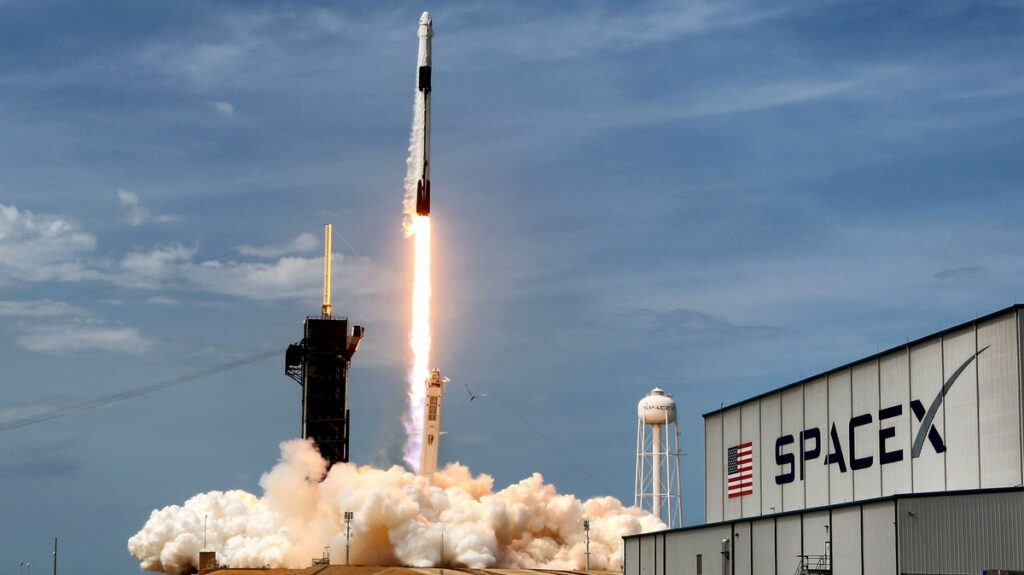[ad_1]
On Saturday, June 13, 2020, SpaceX launched yet another batch of Starlink satellites, continuing the companys mission to build a constellation of satellites that can deliver high-speed internet to the entire planet. Image: Joe Burbank/Orlando Sentinel/Tribune News Service via Getty Images
Space X’s Starlink satellite broadband service promises to deliver better, faster broadband to those just out of reach of cable, fiber, or DSL. But while early speed tests show the service could prove hugely-beneficial for rural Americans without other options, experts say the service won’t be quite as disruptive to the broken U.S. broadband market as you might think.
Starlink relies on lower-orbit satellite constellations capable of providing faster speeds at lower latency than the dumpster fire that is traditional satellite broadband. Whereas traditional satellite is “laggy,” slow, expensive, and usage-capped, Starlink (and similar efforts by companies like Amazon) promise faster, lower latency broadband almost anywhere in the continental U.S.
Early speed test results linked to Starlink IP addresses are promising. Speed tests from those participating in the Starlink beta show peak download speeds upwards of 114 Mbps, with upload speeds topping out at around 40 Mbps. That’s notably faster than many DSL lines, and on par with many mid-tier cable broadband offerings.
Starlink will be particularly welcome news to the 42 million Americans currently out of range of broadband, a problem that’s been highlighted by pandemic lockdowns forcing some kids to huddle in the dirt outside of Taco Bell just to get online.
But while Starlink will certainly help bridge this “digital divide” by bringing better options to rural Americans, Elon Musk has acknowledged the service won’t have the capacity to seriously disrupt regional U.S. telecom monopolies like AT&T, Verizon, Spectrum, and Comcast.
“I want to be clear, it’s not like Starlink is some huge threat to telcos. I want to be super clear it is not,” Musk told attendees of a satellite conference earlier this year.
“If you want to trade stocks in northern Michigan, it will be great,” Mitchell said. “If you want to connect every family in northern Michigan, your job just got harder.”
Starlink comes with other costs as well; namely the severe impact scientists and astronomers say low-orbit satellite constellations will have on scientific research and the night sky. Musk initially claimed such light interference wouldn’t happen or could be easily mitigated. More recently, experts have said there’s no way to effectively mitigate the problem.
Starlink relies on lower-orbit satellite constellations capable of providing faster speeds at lower latency than the dumpster fire that is traditional satellite broadband. Whereas traditional satellite is “laggy,” slow, expensive, and usage-capped, Starlink (and similar efforts by companies like Amazon) promise faster, lower latency broadband almost anywhere in the continental U.S.
Early speed test results linked to Starlink IP addresses are promising. Speed tests from those participating in the Starlink beta show peak download speeds upwards of 114 Mbps, with upload speeds topping out at around 40 Mbps. That’s notably faster than many DSL lines, and on par with many mid-tier cable broadband offerings.
Starlink will be particularly welcome news to the 42 million Americans currently out of range of broadband, a problem that’s been highlighted by pandemic lockdowns forcing some kids to huddle in the dirt outside of Taco Bell just to get online.
But while Starlink will certainly help bridge this “digital divide” by bringing better options to rural Americans, Elon Musk has acknowledged the service won’t have the capacity to seriously disrupt regional U.S. telecom monopolies like AT&T, Verizon, Spectrum, and Comcast.
“I want to be clear, it’s not like Starlink is some huge threat to telcos. I want to be super clear it is not,” Musk told attendees of a satellite conference earlier this year.
“If you want to trade stocks in northern Michigan, it will be great,” Mitchell said. “If you want to connect every family in northern Michigan, your job just got harder.”
Starlink comes with other costs as well; namely the severe impact scientists and astronomers say low-orbit satellite constellations will have on scientific research and the night sky. Musk initially claimed such light interference wouldn’t happen or could be easily mitigated. More recently, experts have said there’s no way to effectively mitigate the problem.
[ad_2]
Source link

